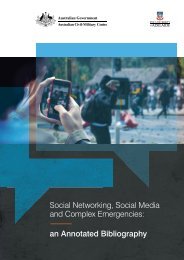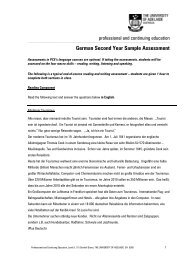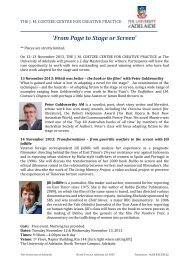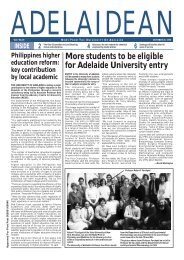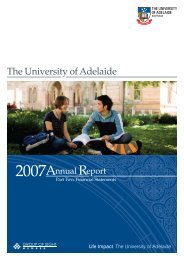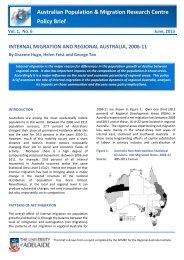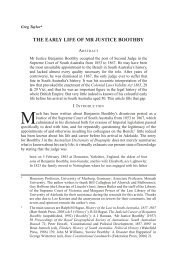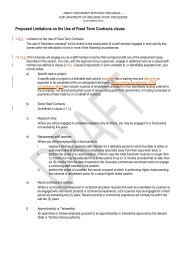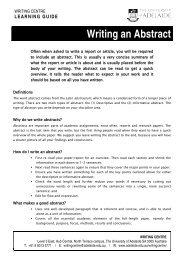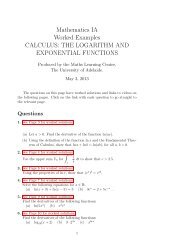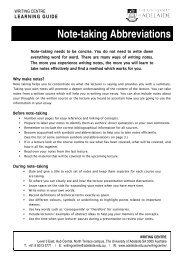Unbridling the Tongues of Women - The University of Adelaide
Unbridling the Tongues of Women - The University of Adelaide
Unbridling the Tongues of Women - The University of Adelaide
You also want an ePaper? Increase the reach of your titles
YUMPU automatically turns print PDFs into web optimized ePapers that Google loves.
<strong>Unbridling</strong> <strong>the</strong> tongues <strong>of</strong> women<br />
have assisted women’s independence <strong>of</strong> men. Child endowment furnishes only one<br />
example. 12 Fur<strong>the</strong>r, views such as Daniels’s derive from analyses <strong>of</strong> welfare states that<br />
were more developed than <strong>the</strong> state was in South Australia in <strong>the</strong> 1870s and 1880s.<br />
It is probably more fruitful, and more accurate, to consider <strong>the</strong> state in that period <strong>of</strong><br />
<strong>the</strong> colony’s history as a site <strong>of</strong> struggle – responsive, within <strong>the</strong> limitations imposed<br />
by a capitalist economy and a patriarchal gender order, to pressure. Besides, <strong>the</strong>re<br />
are discrepancies between <strong>the</strong> events in which Clark and Spence were involved and<br />
<strong>the</strong> account which Spence gave <strong>of</strong> <strong>the</strong>m in her book State Children in <strong>Adelaide</strong>. 13<br />
This should prompt us to ask questions about Spence’s perception <strong>of</strong> <strong>the</strong> constraints<br />
and opportunities which Emily Clark’s project <strong>of</strong>fered, and what she did with <strong>the</strong>m.<br />
Spence’s introduction to philanthropic work coincided with her introduction to<br />
women deliberately trespassing into <strong>the</strong> world <strong>of</strong> men, along a line <strong>of</strong> ra<strong>the</strong>r more<br />
resistance than novel writing. If we consider <strong>the</strong> work that she did in this field, and<br />
<strong>the</strong> ways in which she wrote about it, we may find that <strong>the</strong>re are more than two ways<br />
to tell this story.<br />
Paradoxically, <strong>the</strong> systematic colonisers’ attempts to found a society in which<br />
<strong>the</strong> economy, religion, education, even poor relief, would operate freely, unhampered<br />
and unassisted by government, engendered instead a society in which primary<br />
responsibility for poor relief became centralised in a department <strong>of</strong> <strong>the</strong> colonial government.<br />
No doubt this irony owed something to <strong>the</strong> high degree <strong>of</strong> centralisation<br />
<strong>of</strong> South Australia’s financially and politically powerful in <strong>Adelaide</strong>. Clearly it<br />
owed much to traditions established in <strong>the</strong> early days <strong>of</strong> settlement, when colonists<br />
clung so fiercely to <strong>the</strong> foundations <strong>of</strong> <strong>the</strong> fortunes <strong>the</strong>y were making from land<br />
speculation, that Gawler was unable to raise <strong>the</strong> subscriptions necessary to build an<br />
infirmary. His successor, Grey, found it necessary to allocate funds from <strong>the</strong> general<br />
revenue for minimal provision for <strong>the</strong> destitute, lest <strong>the</strong>y starve. And Grey’s successor<br />
Robe, felt compelled to make grants-in-aid to religion and education. 14 <strong>The</strong><br />
government agencies established to administer such funds – <strong>the</strong> Destitute Board,<br />
for instance, and <strong>the</strong> Education Board – were, in accordance with <strong>the</strong> founders’ voluntaryist<br />
principles, voluntary bodies, even though <strong>the</strong>y were appointed by government.<br />
<strong>The</strong>ir members gave <strong>the</strong>ir services gratuitously so <strong>the</strong>y were not open to <strong>the</strong><br />
charges <strong>of</strong> indifference, place-seeking or corruption that voluntaryists might level at<br />
paid government <strong>of</strong>ficers. 15 Fur<strong>the</strong>r, those boards were administering funds from <strong>the</strong><br />
general revenue. Until late in <strong>the</strong> 19 th century, that came largely from indirect taxation<br />
and land-sales, so <strong>the</strong> major pr<strong>of</strong>it-makers undoubtedly considered that <strong>the</strong>y<br />
80



